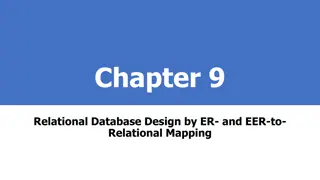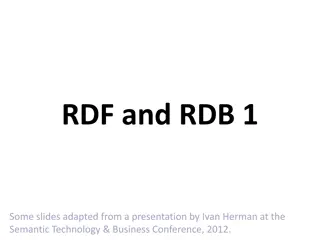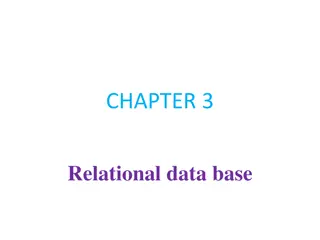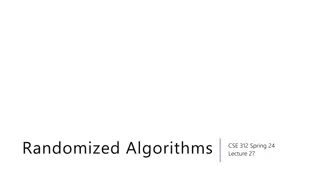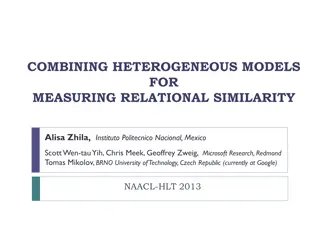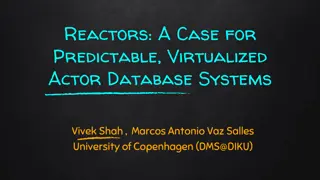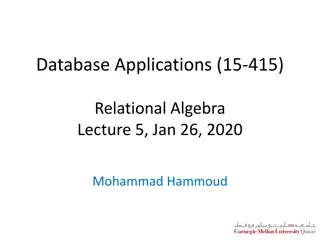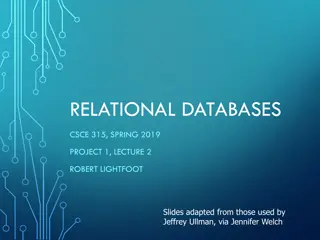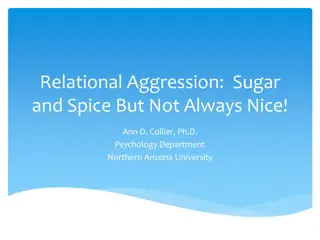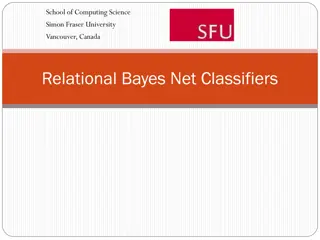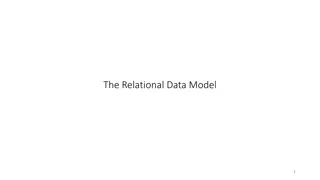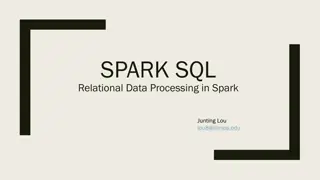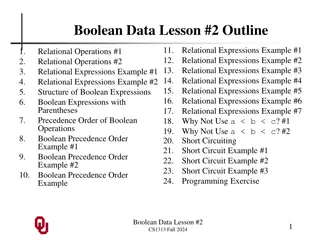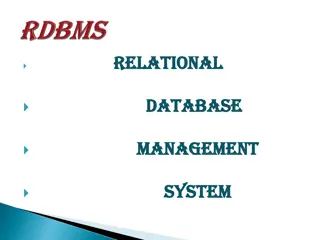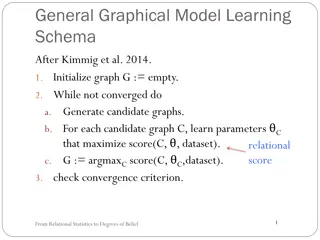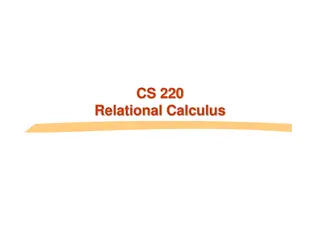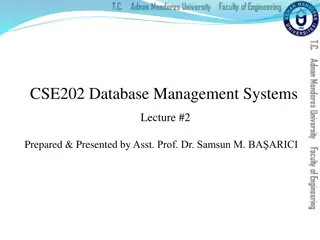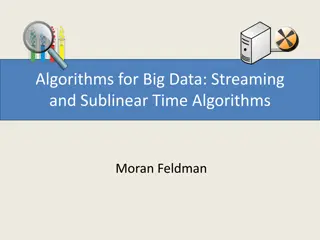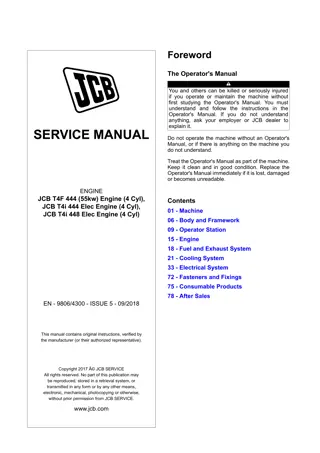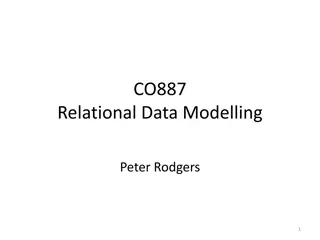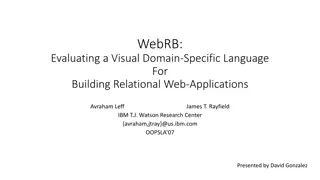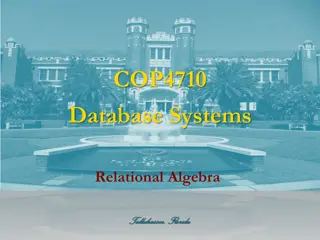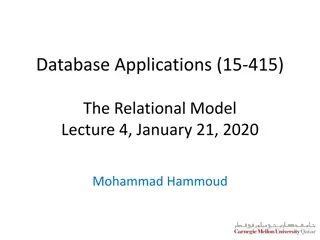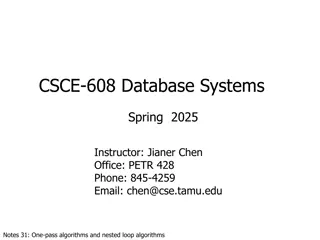Progressive Approach to Relational Entity Resolution
In this research paper authored by Yasser Altowim, Dmitri Kalashnikov, and Sharad Mehrotra, a progressive approach to relational entity resolution is presented. The study focuses on balancing cost and quality in entity resolution tasks for relational datasets. The goal is to develop a method that ac
2 views • 20 slides
Relational Database Design and Mapping Techniques
Explore the process of mapping Entity-Relationship (ER) and Enhanced Entity-Relationship (EER) models to relational databases. Learn about relational model concepts, mapping algorithms, and the goals and steps involved in the mapping process. Discover how to preserve information, maintain constraint
3 views • 42 slides
Combining Graph Algorithms with Data Structures and Algorithms in CSE 373 by Kasey Champion
In this lecture, Kasey Champion covers a wide range of topics including graph algorithms, data structures, coding projects, and important midterm topics for CSE 373. The lecture emphasizes understanding ADTs, data structures, asymptotic analysis, sorting algorithms, memory management, P vs. NP, heap
3 views • 38 slides
Enduring Relational Themes in Psychotherapy
Exploring the concept of Enduring Relational Themes (ERTs) in psychotherapy, this content delves into the history of transference in Gestalt therapy, contemporary psychoanalysis perspectives, forms of transference, and Lynne Jacobs' insights. It highlights how ERTs manifest, their impact on therapy,
6 views • 9 slides
Exporting Relational Data to RDF: Strategies and Considerations
Explore the process of mapping relational data to RDF, including the choice of RDF vocabulary, defining mapping techniques, and exporting strategies. Learn about RDB systems that support RDF, direct mapping approaches, and the use of hybrid storage solutions. Discover how to bridge SPARQL and SQL fo
4 views • 13 slides
The Key Concepts of Relational Databases
Introduction to the fundamental concepts of relational databases including the relational model proposed by Edgar F. Codd, relation schemes, relation instances, keys for a relation, and more. Discover the significance of keys, candidate keys, superkeys, and primary keys in database design.
0 views • 27 slides
Relational Databases and File-Based Systems
This chapter delves into the fundamental concepts of databases, comparing them to file-based systems, and highlighting the significance of relational databases in modern integrated AISs. It explores the difference between logical and physical views of databases, introduces key concepts such as DBMS
1 views • 70 slides
Randomized Algorithms: A Deep Dive into Las Vegas and Monte Carlo Algorithms
Randomized algorithms incorporate randomness into computations, with Las Vegas algorithms always providing the correct answer but varying in time, while Monte Carlo algorithms occasionally give wrong answers. Quick Sort is a classic Las Vegas algorithm that involves pivoting elements for sorting. Ch
4 views • 21 slides
Enhancing Relational Similarity Measurements: A Model Combination Approach
This study explores combining heterogeneous models for measuring relational similarity, showcasing the importance of general relational similarity models. It discusses the degrees of relational similarity and introduces a directional similarity model that outperforms previous systems. The approach l
0 views • 23 slides
Reactor: A Case for Predictable, Virtualized Actor Database Systems
Exploring the integration of actor programming models in modern relational databases to achieve high performance. The focus is on addressing challenges related to stored procedures, data partitioning, modularity, isolation, software engineering, and performance. The talk outlines motivation, the rel
0 views • 41 slides
Relational Query Languages in Database Applications
In this lecture, Mohammad Hammoud discusses the importance of relational query languages (QLs) in manipulating and retrieving data in databases. He covers the strong formal foundation of QLs, their distinction from programming languages, and their effectiveness for accessing large datasets. The sess
0 views • 39 slides
Challenges and Innovations in Relational Engine Algorithms
Exploring the complexity of processing graph data in relational query engines, this content delves into the challenges faced, practices adopted in academia, and innovative solutions like LMS-NPRR, trie join, and specialized data structures. It discusses the difficulties in handling acyclic vs. cycli
1 views • 27 slides
Mathematical Analysis of Algorithms in CMPE371 - Fall 2023-2024
Explore the mathematical analysis of algorithms in CMPE371 for Fall 2023-2024, focusing on non-recursive and recursive algorithms. Learn how to analyze non-recursive algorithms by deciding on input size parameters, identifying basic operations, and simplifying summations. Dive into recursive algorit
2 views • 31 slides
Relational Evangelism and Sharing Your Faith Testimony
Discover the essence of relational evangelism and effectively articulating your testimony of faith. Explore the significance of the Gospel message and different evangelistic approaches while delving into the concept of personal evangelism without imposition. Embrace the idea of faith arising in vari
0 views • 32 slides
Fundamentals of Relational Databases in CSCE 315 - Lecture Highlights
Introduction to relational databases covering topics such as relational data model, schemas, converting from entity-relationship model, entity sets, relations, relationships, combining relations, and practical examples. Learn about storing data in tables, attributes, database organization, and the i
1 views • 18 slides
Relational Aggression in Girls: The Impact on Social Relationships
Relational aggression, a form of social bullying, can have detrimental effects on girls' social relationships and self-esteem. This type of indirect aggression includes behaviors like exclusion, spreading rumors, and social manipulation. Understanding and assessing relational aggression is crucial f
2 views • 22 slides
Enhancing Spatial Data Analysis in QGIS
Explore the integration of relational databases with QGIS to facilitate efficient spatial data analysis. Discover the importance of recognizing spatial relationships within data sets and the solutions to enhance QGIS for relational datasets. Overcome challenges and delve into the intersection and su
1 views • 25 slides
Relational Bayesian Networks in Statistical Inference
Relational Bayesian networks play a crucial role in predicting ground facts and frequencies in complex relational data. Through first-order and ground probabilities, these networks provide insights into individual cases and categories. Learning Bayesian networks for such data involves exploring diff
0 views • 46 slides
Exploring the Role of Algorithms in Game Design
Delve into the world of algorithms in game design, from understanding the fundamental concept of algorithms to their pervasive presence in various aspects of gaming, such as military simulations, medical simulations, and gameplay mechanics. Explore how algorithms shape experiences in different types
0 views • 10 slides
The Relational Data Model and Database Concepts
Delve into the world of relational data modeling, database integrity rules, and structure. Explore how a university database in MS Access utilizes relational tables and fields to store information. Learn about the key terminology associated with relational databases, such as primary keys, foreign ke
1 views • 69 slides
Women's Self-Esteem and Relationship Behavior Study: Insights and Implications
This study explores the relationship between women's self-esteem, relational behavior, and perceptions of relational desirability. Findings indicate that self-esteem does not significantly predict relational behavior, with women feeling less desirable than their partners reported investing more in r
2 views • 9 slides
Relational Child and Adolescent Psychotherapy
Explore the concepts of relational child and adolescent psychotherapy involving attachment patterns, intersubjectivity, corrective emotional experiences, and the role of the relational psychodynamic psychotherapist in providing corrective emotional experiences essential for the child's development.
0 views • 25 slides
Overview of Spark SQL: A Revolutionary Approach to Relational Data Processing
Spark SQL revolutionized relational data processing by tightly integrating relational and procedural paradigms through its declarative DataFrame API. It introduced the Catalyst optimizer, making it easier to add data sources and optimization rules. Previous attempts with MapReduce, Pig, Hive, and Dr
0 views • 29 slides
Relational Operations for Boolean Expressions
Learn about relational operations in Boolean expressions through examples and explanations. Discover how to compare numeric operands to produce Boolean results, covering equal to, not equal to, less than, less than or equal to, greater than, and greater than or equal to operations. The content inclu
0 views • 25 slides
Evolution of Database Management Systems
The evolution of Database Management Systems (DBMS) began with file systems and punched cards in the 1950s, followed by hierarchical and network models in the 1960s and 1970s. The 1980s introduced relational databases like Ingres, Oracle, DB2, and Sybase. The 1990s saw the rise of object-oriented an
1 views • 31 slides
Learning Bayesian Network Models from Complex Relational Data
Delve into the process of learning Bayesian network models from complex relational data, extending traditional algorithms to suit relational data structures. Explore key concepts like likelihood functions, graphical model initialization, and parameter learning for effective model fitting.
0 views • 20 slides
Introduction to Relational Calculus and Algebra in Database Management
Explore the fundamental concepts of relational calculus and algebra in the domain of database management. Understand the differences between declarative and imperative query languages and learn to retrieve information using practical examples and theoretical frameworks such as tuple relational calcu
0 views • 23 slides
CSE202 Database Management Systems
The basics of relational algebra and calculus in database management, covering unary and binary relational operations, query examples, tuple and domain relational calculus. Explore the set of operations and declarative language used for specifying relational queries.
0 views • 45 slides
E-COMMERCE
A relational database is a collection of data items organized in tables for efficient data access. Explore the connection between e-commerce and relational databases, including essential tools, required knowledge, and deliverables. Learn how to build and manage e-commerce websites, payment transacti
0 views • 7 slides
Algorithms for Big Data: Streaming and Sublinear Time Algorithms
Motivation behind big data research, exploration of sublinear time algorithms, and analysis of algorithms for diameter approximation and property testing. The talk delves into theoretical algorithms for big data problems, focusing on streaming and sublinear time algorithms, showcasing classical exam
0 views • 30 slides
Relational Database Query Execution
In the world of relational databases, query execution is a crucial process involving steps like compilation, optimization, and physical plan generation. This involves converting SQL queries into logical query plans, selecting algorithms, and optimizing operations for efficient performance. Different
0 views • 9 slides
JCB T4F 444 (55KW) Engine (4 Cyl), T4i 444 Elec Engine (4 Cyl), T4i 448 Elec Engine (4 Cyl) Service Repair Manual Instant Download
JCB T4F 444 (55KW) Engine (4 Cyl), T4i 444 Elec Engine (4 Cyl), T4i 448 Elec Engine (4 Cyl) Service Repair Manual Instant Download
0 views • 24 slides
Overview of System R: Relational Data Model and SQL Query Language
System R, a pioneering system in the history of databases, introduced the concept of building an RDBMS based on the Relational Model. The core of System R lies in the Relational Data Model, defining schemas and relations as tables with columns and rows. Additionally, the SQL Query Language plays a c
0 views • 24 slides
Understanding the Relational Model and Its Key Concepts
The relational model revolutionized database management by providing a strong theoretical foundation and addressing the shortcomings of previous models. It focuses on data independence, logical and physical separation, communicability, and set-processing to enhance programmer productivity. Key conce
0 views • 25 slides
Understanding Relational Data Modelling: A Comprehensive Overview
Explore the transition from conceptual modelling to relational schema in relational data modelling. Learn about conceptual models, relational schemas, entities, relationships, primary keys, foreign keys, and more. Discover how to transform a conceptual model into a relational database model effectiv
0 views • 23 slides
Evaluating WebRB: A Visual Language for Relational Web Applications
Discover insights on WebRB, a visual domain-specific language for building relational web applications, detailing its key features, problems addressed, implementation approach, and evaluation results. Explore how it aims to bridge the gap between imperative languages and relational design in web dev
0 views • 9 slides
Understanding Relational Algebra and Database Query Operations
Explore the fundamentals of relational algebra, database querying, and common operations, such as set operations and relational operators. Learn how to manipulate data using high-level query languages like SQL and understand the importance of relational algebra in database systems.
0 views • 26 slides
Understanding the Relational Model in Database Applications
Explore the fundamentals of the relational model, including its tabular representation, key constructs, domain constraints, and relevance in modern database systems. Discover how the relational model simplifies data representation and enables efficient query execution in relational databases.
0 views • 56 slides
Efficient Algorithms for Relational Algebraic Operations in Database Systems
Explore one-pass and nested loop algorithms, table locking, query languages, and more in the context of database systems. Learn about efficient operations, memory management, and relational algebraic operations implementing projections, selections, joins, and more.
0 views • 73 slides
Efficient Algorithms for Relational Database Systems Operations
Explore efficient algorithms for implementing relational algebraic operations like projection, selection, set/bag operations, join operations, and more in relational database systems. Learn about one-pass and multi-pass algorithms, as well as two-pass techniques such as sort-based and hash-based app
0 views • 58 slides

